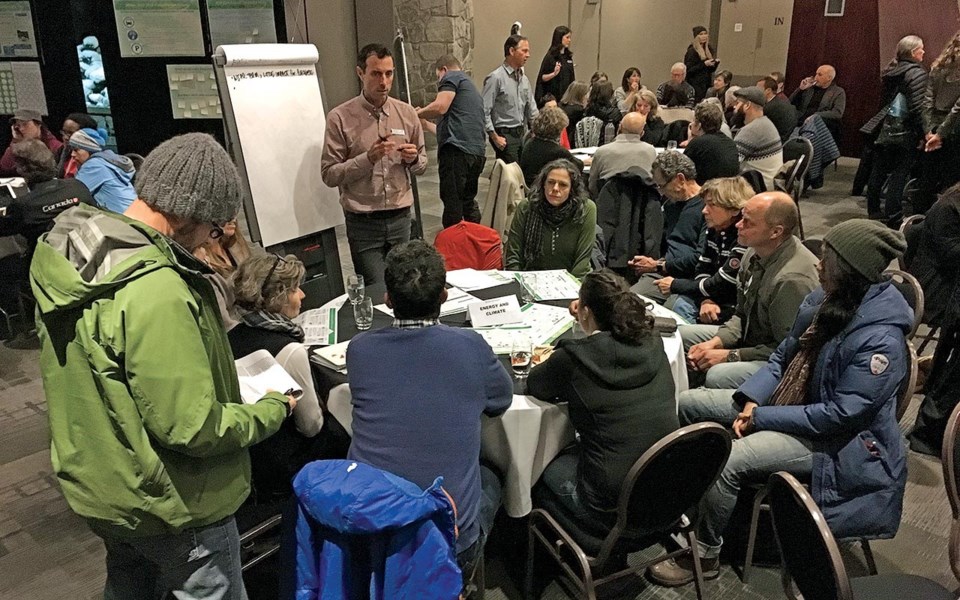While the Resort Municipality of Whistler's (RMOW) 121-hectare "land bank" in Cheakamus Crossing has been oft discussed in recent years — particularly as the local housing crunch has tightened — Whistlerites got their first look at plans for the land at a community forum on Nov. 2
Site analysis is taking place in three areas around the existing Cheakamus neighbourhood.
"There is work currently undergoing on that... evaluation of all municipally owned lands down at Cheakamus, and to prioritize those for resident-restricted homes," said economic development manager Toni Metcalf in her forum presentation at the conference centre.
"We're looking at determining immediately available sites so that building can commence as quickly as possible whilst retaining some longer-term land options as the community continues to evolve."
The expansion project is looking to maximize employee housing while tying in the different considerations of the neighbourhood, like recreational opportunities and access to trails.
"It's important to recognize community values regarding the protection of our natural corridors and the natural features of the lands that are there," Metcalf said.
The plans being considered include 15 hectares above the existing neighbourhood (deemed "Phase 2") and 49 hectares below it known as the Cheakamus Lower Lands.
"Not all of that land is going to be available for housing... there are significant rock formations that may not be suitable (and) there's a number of different features recreation-wise that will need to be preserved," Metcalf said.
Work is already underway to further analyze the Phase 2 lands, with four sites identified for potential development — one of which could work for immediate development.
"Work will be progressed to develop concepts for that and develop a plan," Metcalf said.
In the Lower Lands, three sites have been identified for potential development.
In the longer term, a site near Jane Lakes Road has been identified for potential residential use.
"Development concepts for those most immediate next phases would be developed in the next two to three months, and that will come back to the community at that point in time," Metcalf said. "So there is a lot of work happening on enhancing resident-restricted housing supply."
Expansion at Cheakamus is just one of seven recommendations being proposed by the Mayor's Task Force on Resident Housing.
If all goes according to plan, the RMOW hopes to add 1,000 new employee beds over the next five years, including 205 by the end of 2017 and another 160 by the end of 2018.
But in a letter to council dated Oct. 31, local developer Steve Bayly questioned the accuracy of the RMOW assessment.
"In my view, 1,000 beds fall short of the current need. Most concerning is that 850 of the beds are predicted to come from in-fill (300) and private sector development (550) where Whistler has had little success in the past," Bayly wrote.
Further, with 2,500 new employees gained in the last five years and more growth projected, the RMOW's target of 1,000 beds, even if fully realized, may fall well short of future need.
"In my view, total additional employee beds needed to run the resort at build out may be as high as 2,500 new beds and that is before such things as future leakage and gentrification," Bayly wrote.
In a follow-up phone call, Bayly noted there is federal and provincial money coming available for housing, and municipalities should position themselves to take advantage of it while they can.
"If you're ready for it, you'll get it, and if you're talking about it, you're not going to get it," he said.
"You've got the lands (in Cheakamus) that were given for that purpose, you've got a track record of doing this stuff with the Whistler Housing Authority, you've created all this in the past — don't try to reinvent the wheel. Use the land that you've got now and use what you know works."
Dave Brownlie, former Chief Operating Officer for Whistler Blackcomb, was also at the forum on Nov. 2, and in a follow-up phone call he offered thoughts similar to Bayly's.
"It's good to see that we're moving forward as a community, and obviously council and staff are really making some progress on resident-restricted housing, which is so important. I guess personally I would just like to see more, sooner," Brownlie said.
"I think the challenge is, with what you have on the table, over five years, we'll probably be in the same place... I think we need to probably move faster and get more product going for everybody."
Then councillor-elect Cathy Jewett attended the forum — her last as a private citizen.
"A lot of passionate ideas got put on the table, on many tables actually, and we're looking forward to, in our retreat next Tuesday, looking at some of the points that were raised at those tables, and starting to work towards our plan for the upcoming year," Jewett said, after her swearing-in ceremony on Tuesday, Nov. 7.
For more on the forum, head to www.piquenewsmagazine.com/whistler/hundreds-turn-out-for-community-forum/Content?oid=5328634.
Presentation materials can be found at www.whistler.ca/communityforum.
Comments can be provided by email to feedback@whistler.ca.




